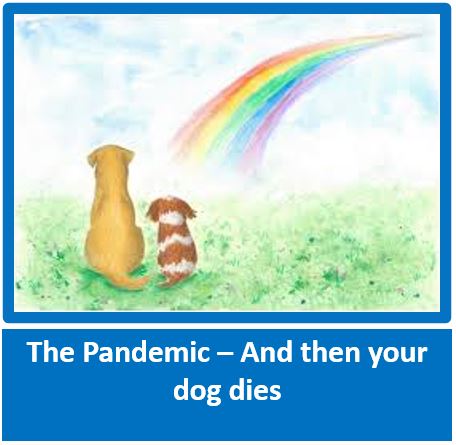Do Dogs Know When They are Dying?
www.dailypaws.com - very nice website with some interesting articles - do visit when you get a chance and enjoy!
What you observe is a clear indicator about what your dog is feeling.
Any pet lover will tell you: it's excruciating to watch your adorable furball friends suffer, especially when they might be ready to cross the rainbow bridge. But do dogs know they're going to die? This is an existential question we struggle with as humans, too, and we don't have all the answers for ourselves, much less our canine buddies.
Still, there are clues to what dogs might be aware of and, more importantly, what we need to notice in the layers of their whole being to understand how we can help if they're close to passing away.
Do Dogs Know When They're Going to Die?
We might think we know what's going on in a dog's mind simply because of the way they return our affection—or slather us with theirs! Scientists continue to be fascinated by the possibilities to enhance our relationship with our canine companions, and there's interesting research on the subject.
For example, in a detailed article for the Dana Foundation, neuroscientist Gregory Berns, author of What It's Like to Be a Dog, pointed out that while some dogs are more eager to play fetch, others are not. Does that mean they don't understand the cue—or understand but just don't want to play? Berns writes, "It's all too tempting to project a human explanation onto the dog, to anthropomorphize. We must be careful in generalizing about dog findings, as there is no such thing as a generic dog. Just like there isn't a generic human." Since dogs can't speak, Berns says, their behavior tells us a lot about what they're feeling.
Haylee Bergeland, CPDT-KA, CBCC-KA, RBT, is the founder and executive director of the Iowa Human-Animal Bond Society and Daily Paws' health and behavior expert. She says it's tough to know how much a dog understands or is feeling near the end of their life, but some behaviors might be more apparent. "Many dogs appear to be more 'clingy' or attached, following you around consistently and remaining close," Bergeland says. "Other dogs seem to distance themselves and want to be alone more than they normally would."
She's also noticed some dogs whining and barking more, along with moments of almost hyperactivity, "then suddenly becoming quiet and still—as if they have a desire to expend some energy, have a bit more fun, but just can't quite do it."
Other researchers and veterinarians rely on "citizen science", which is a collaborative effort between the general public and professional scientists to study the natural world, to determine how dogs know they're dying. Naturally, as in-tuned as we are to our pups' needs, this leads us to believe they comprehend what's happening to them.
What Do Dogs Do When They Know They're Dying?
Your observations of mental, emotional, and physical symptoms are integral to making your furry best friend's final days or weeks as stress-free as possible. Leslie Sinn, DVM, DACVB, CPDT-KA is a veterinary behaviorist at Behavior Solutions and a member of the Daily Paws Advisory Board. She says pay attention to these signals:
- Decreased interest in play or social interactions
- Loss of learned behaviors
- Lack of interest in previous activities they once enjoyed
- Poor appetite
- House soiling
- Changes in sleep/wake cycle
- Nighttime restlessness
- Increased time remaining stationary
- Additional signs of discomfort, such as crying, panting, and pacing
Do dogs wander off to die? Not as a general rule, but don't be surprised if your dog isn't as receptive during this time—it's nothing personal. "If your dog wants to be left alone, if they don't want to be touched, go for walks or play, respect that. Make sure everyone in your household does the same," Bergeland says. "Instead of cuddling or lots of pets or play sessions, you can show you're still there and support them by giving them treats, talking to them softly (even from across the room), praising them, offering comfortable spots to nap in the house, and keeping the house quiet." Something as simple as your proximity and reassuring voice are also comforting.
Most of all, be empathetic. "Understand that when dogs are nearing end of life, their behaviors and personality may change. Be prepared for this," she says. "Now is not the time to get upset about accidents in the house or not wanting to go for walks or whatever. Be there for them."
Depending on your dog's symptoms, you might have to think of different means of palliative care, which helps relieve pain without dealing with his underlying condition. "Things owners can do to make a pet more comfortable include accommodations for physical limitations such as ramps, providing soft bedding as a cushion, pee pads if needed, massage, warm compresses, and feeding savory/tasty food," Sinn says. "Anything that helps mitigate the dog's current limitations and discomfort. Certainly appropriate pain medication under the guidance of a veterinarian would also be indicated."
Crossing the Rainbow Bridge Together
At what point do you have a serious conversation about your dog's current state of being? Sinn suggests an assessment, known as the HHHHHMM Scale.
According to Merck Vet Manual, this scale refers to:
- Hurt - Is your pet's pain controlled?
- Hunger - Can your pet still eat?
- Hydration - Can your pet still drink enough water?
- Hygiene - Can your pet be kept clean?
- Happiness - Is your pet able to enjoy activities and/or mental stimulation?
- Mobility - Can your pet move around on his own?
- More good days than bad
Without question, your grief is a factor in this transition as well. And you know what? That's okay. You don't have to worry about upsetting your dog more by showing what a joy he's been in your life. "If you feel like crying while you're comforting your canine best friend, then cry," Bergeland says. "You love them and they love you."





